Apr 6, 2024
English: Interjections
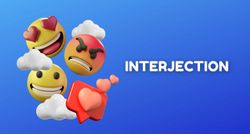
Here are some rules for using interjections in English:
Punctuation
When used at the beginning of a sentence, a short interjection should be followed by a comma. If an interjection is used in the middle of a sentence, it should be preceded and followed by commas. If an interjection forms a sentence by itself, it can be followed by a period, question mark, or exclamation mark. For example, "Oh. I don't know" or "Hurray! We've just won the lottery".
Placement
Interjections can be used before or after a sentence, alone, or within a sentence as a parenthetical element. For example, "I may not succeed, but, hey, at least I tried".
Usage
Interjections can be used to express emotions like surprise, delight, terror, and disgust. For example, "ew" to express feeling dirty or "ouch" to express pain. Interjections can also be used to express uncertainty or ask a question, such as with a question mark. For example, "Hmm?" . Interjections can also be used to express a direction or order, such as with volitive interjections like "stop", "hush", or "shoo".
Context
Interjections can be used in informal contexts, such as creative writing, to add realism and excitement. However, it's generally not recommended to use too many interjections in formal contexts
Common Interjection Use
1. There is no set rule for using interjections. In fact, you can place emotion words throughout a sentence at the beginning, middle, or end. Interjections can also come after any part of speech, such as a verb, adjective, or noun.
How and When to Use Interjections?
When using interjections, there are some very important punctuation rules that you should keep in mind. Given below are the points you have to remember.
When a short interjection is used in the beginning of a sentence, it should be followed by a comma.
When an interjection forms a sentence by itself, the interjection can be followed by a full stop, a question mark or an exclamation mark.
When an interjection is used in the middle of a sentence, the interjection has to be preceded and followed by a comma.
In a conversation, interjections are sometimes allowed to stand alone.
It is better if you do not use too many or any interjections in a formal context.
2. Types of Interjection
An interjection is a word that expresses strong emotion. It stands alone and is not grammatically related to the rest of the sentence.
Interjections are words or phrases that are inserted into a sentence to express an emotion or to clarify something. There are three types of interjection: volitive, emotive, and cognitive.
Volitive interjections are used to change the course of a conversation or to get someone’s attention.
Emotive interjections express how the speaker feels about what is being said.
Cognitive interjections provide information that is not already in the sentence
3. What are Interjections?
An interjection is a word that expresses strong emotion. It stands alone and is not grammatically related to the rest of the sentence. You can use an interjection to express joy, surprise, approval, or disapproval.
Some interjection examples:
– Volitive Interjection: Oh no! I’m late for my meeting.
– Emotive Interjection: Yay! We won the game.
– Cognitive Interjection: Hmm, I wonder what she meant by that comment.
As you can see, each interjection expresses a different emotion.
4. Types of Interjections
Volatile interjection:
Volatile interjections are the words or phrases used to express sudden feelings. For example, ‘ouch’, ‘wow’, ‘oops’, etc. Volatile interjections do not need a response from the person you are talking to.
Volatile Interjection in the sentence:
Ouch! That hurt.
Wow! That’s amazing.
5. Emotive interjection:
Emotive interjections are the words or phrases used to express an emotion. For example, ‘I’m so happy, ‘I’m so sad, ‘I’m so angry. Emotive interjections usually need a response from the person you are talking to.
Emotive Interjection in a sentence:
I’m so happy for you!
I’m so sorry about that.
6. Cognitive interjection:
Cognitive interjections are the words or phrases used to express a thought. For example, ‘hmm’, ‘Hmm, I don’t know about that, ‘I see’, etc. Cognitive interjections usually need a response from the person you are talking to.
Cognitive Interjection in a sentence:
Hmm, I don’t know about that.
I see. What do you think?
7. List of Volatiles interjection:
– Oh!
– Wow!
– Alas!
– Ouch!
List of Emotive interjection:
– Bravo!
– Congratulations!
– Damn it!
– Hurrah!
8. List of Cognitive interjection:
– Seriously?
– Really?
Errors related to interjection:
There are some errors related to interjection that is often committed by non-native speakers of English. They are as follows:
-Using an interjection without a noun or pronoun: Oh, how beautiful the flowers are! (Wrong)
-Using an interjection at the beginning of a sentence: How nice to see you! (Wrong)
-Using an interjection at the end of a sentence: I’m so tired! Oh, dear! (Wrong)
-Using an interjection with a comma: Oh, I’m so sorry! (Wrong)
-Using an interjection with a full stop: Oh! This is great news. (Wrong)
9. Rules for Interjection:
There are no rules governing the use of interjections. They can be used at the beginning, middle, or end of a sentence. They can also be used alone as a complete sentence. When an interjection is used in writing, it is usually followed by a comma, exclamation point, or question mark.
Conclusion
Volitive interjections are the most common type of interjection. They express emotions such as happiness, anger, surprise, or pain.
Emotive interjections are used to express strong emotions such as love, hate, fear, or joy.
Cognitive interjections are used to convey information or make a statement.
Therefore, we can see that there are many different types of interjections that we can use in our daily lives. Interjections are a part of our everyday lives whether we realize it or not. They can be used to express a variety of emotions and thoughts. Next time you’re having a conversation, pay attention to the interjections that are used.
What are the 7 types of interjection?
The main types of interjections are:
Primary interjections.
Secondary interjections.
Volitive interjections.
Emotive interjections.
Cognitive interjections.
Greetings and parting words/phrases
Interjections
Fill in the blanks in the sentences with suitable interjections.
(Use: Hello! Wow! Hush! Look out! Oh! Hurrah! Alas! Eek!, help
1. __________! I am Kareena.
2. __________! Stop making noises.
3. __________! You will fall in the pit.
4. __________! The shop is on the fire.
5. __________! What fun they had!
6. __________! The little baby is sleeping.
7. __________! What a presentation!
8. __________! A lizard!
9. __________! We won the game.
10. __________! He lost the match.
Interjections can be punctuated using a comma, exclamation mark or a question mark
Example:- Listen,
Wow!
Oh really?
Choose the correct word. Shoo, ouch, Wow, hey, yes, huh, hi, careful, whew, wow
1. ______ I was bitten by a mosquito
2. ________ give that to me.
3. Why can’t you wake up on time, _____?
4. ____ I’m happy you came home.
5. _____! You look awesome in this dress.
6. ______, the lion is famished!
7. _______, I will have a coffee please.
8. _______, that was very close.
9. ______ That was quick!
10.______” shouted the old man when he saw monkeys plucking the mangoes.
Choose the correct interjection.
( Wow, hurray, yeah,, bravo, atlas, hi, hey, hello, yah, ah)
1. _________It's time to go home.
2. _________you have done well.
3. _________How are you?
4. _________Is there anyone home?
5. _________come and look at this!
6. _________, it's not that simple.
7. __________I've finished my exam!
8. __________, what a lovely baby!
9. ____________you need a break.
10. ____________That's totally awesome!
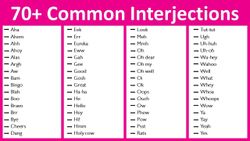
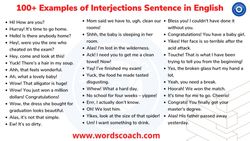
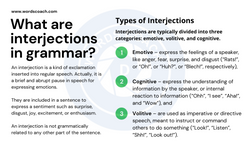
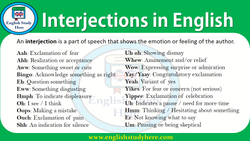
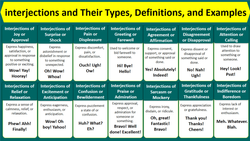
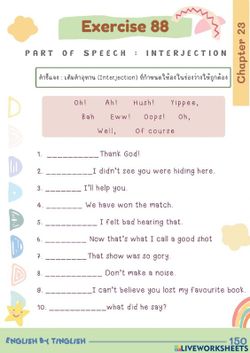
(Ouch, yippee, bravo, alas, my God, well, uh, ah, wow, oh no)
1. ______, that is new!
2. ______ That hurt me more than I thought it would.
3. ______ We got the tickets to the movie premier night.
4. ______ I don’t want to do it this way.
5. ______ You did a really great job with that piece of furniture.
6. ______ now I understand what you were trying to say.
7. ______ That should have really upset you.
8. ______ I have not cleared the internal assessment.
9. ______ That was a really brave thing to do.
10. _______ The waiting list for the reservation seats is too long; I don’t think we would get a seat.
1. Well, that is new!
2. Ouch! That hurt me more than I thought it would.
3. Yippee! We got the tickets to the movie premier night.
4. Uh, I don’t want to do it this way.
5. Wow! You did a really great job with that piece of furniture.
6. Ah, now I understand what you were trying to say.
7. Oh no! That should have really upset you.
8. Alas! I have not cleared the internal assessment.
9. Bravo! That was a really brave thing to do.
10. My God! The waiting list for the reservation seats is too long; I don’t think we would get a seat.
Use the appropriate interjection for the sentences.
Wow!
Yoo-hoo!
Oh no!
Gosh!
Bravo!
1. …….Oh no! I came first in the class.
2. …….Ewww! We made it to the finals.
3. …….Yes! I made a mistake.
4. …….Yuck! I am so excited about this session.
5. …….What! This is so delicious
Identify the Interjection
1. Hey, I'm glad that you are attending my session.
2. Oh Gosh! You look so pretty today.
3. That was your best performance to date, bravo!
4. It’s unbelievable you failed in the exam, bah.
5. Hmm, I don’t know why I am feeling low today.
6. Eureka, I got a gold medal today.
7. "Shoo, go away!" said the lady when she saw the dog entering her home.
8. I think the presentation ends here, darn.
9. Stop! Always know the syllabus before starting the preparation.
10. Yippee, I completed the homework all by myself.
In the below sentences, you need to select the most appropriate interjection from the options given-
The options are- Wow, Seriously, Oh God, Dang, Oh No, Yippee, Incredible, Bingo, Geez, Yay
1. ______________, why don’t you ever come on time?
2. ______________, I'm so happy that you made up for the online session.
3. ______________, it's not every day that you see a rainbow in the sky.
4. ______________! How can you wear that for your friend’s birthday party?
5. The end of the movie was just unexpected , ______________!
6. ______________! Your idea is just perfect.
7. ______________, I don’t know how to react, it’s an awkward situation.
8. It’s unbelievable I came first in the class, ____________!
9. ______________, my favorite singer is coming in our town.
10. This is my first phone,_______________
1- By knowing the types, you must have got an idea that interjections describe the individual's particular mood or feeling. You use different words in your everyday life but do not use them in formal aspects. These types of words are categorized under this segment of interjections. Such as-
Wow! It looks great on you.
Aww! Your dog is so cute.
What! You never told me this was included in the syllabus.
2- You must have noticed that sometimes, people use sounds that are not words in the middle of a sentence. These interjections interrupt the conversation or capture the other person's attention for a moment. Such as-
I like that, umm, maybe I don't
I want to say, uh, I love you.
3- There are a few interjections that are just used to express a yes or a no. Such as-
Yes! I will look into the matter for you.
Nah! I don’t think it will work out.
4- Often, you use interjections to fetch another person's attention. Such as-
Hey! Can you pass the bowl?
Yoo-hoo! I cleared the exam with 90% marks.
By undefined
15 notes ・ 12 views
English
Elementary